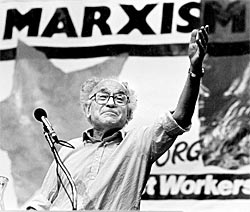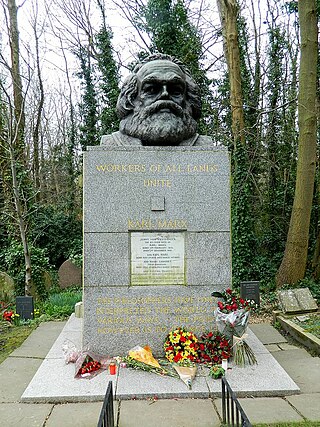Related Research Articles

Socialism in New Zealand had little traction in early colonial New Zealand but developed as a political movement around the beginning of the 20th century. Much of socialism's early growth was found in the labour movement.
The League for Socialist Action (LSA) was the premier Trotskyist organization in Canada for much of the 20th century. Throughout its history the LSA went through many different names and iterations. In chronological order it was known as: the International Left Opposition (Trotskyist) of Canada, the Workers Party of Canada, the Socialist Policy Group, the Socialist Workers League, the Revolutionary Workers Party, The Club, the Socialist Education League, and the League for Socialist Action.
The Revolutionary Socialist League (RSL) was a Trotskyist group in the United States established in 1973 and disbanded in 1989.
The Marxist Group was an early Trotskyist group in the United Kingdom.
The Spartacist League is a Trotskyist political grouping which is the United States section of the International Communist League, formerly the International Spartacist Tendency. This Spartacist League named themselves after the original Spartacus League of Weimar Republic in Germany, but has no formal descent from it. The League self-identifies as a "revolutionary communist" organization.

The Fourth International (FI), founded in 1938, is a Trotskyist international. In 1963, following a ten-year schism, the majorities of the two public factions of the Fourth International, the International Secretariat (ISFI) and the International Committee (ICFI), reunited, electing a United Secretariat of the Fourth International.
The International Communist League (Fourth Internationalist), earlier known as the international Spartacist tendency (iSt) is a Trotskyist international. Its largest constituent party is the Spartacist League (US). There are smaller sections of the ICL (FI) in Mexico, Canada, France, Germany, Ireland, Italy, Japan, South Africa, Australia, Greece and the United Kingdom.
The Workers Revolutionary Party (WRP) is a Trotskyist group in Britain once led by Gerry Healy. In the mid-1980s, it split into several smaller groups, one of which retains possession of the name.
The Revolutionary Workers League (RWL) was a radical left group in the United States, lasting from 1935 through 1946. It was led by Hugo Oehler and published The Fighting Worker newspaper.
The Coordinating Committee for the Refoundation of the Fourth International (CRFI) was a Trotskyist international organisation. Its name in Spanish was Coordinadora por la Refundación de la Cuarta Internacional. It was formed in 2004 at a conference in Buenos Aires called by the Movement for the Refoundation of the Fourth International. It had members in South America, Western Europe and the Middle East. The committee had nine members from Argentina, Chile, Greece, Italy, Mexico, Uruguay, Turkey, Finland and Venezuela. They included Jorge Altamira, Savas Matsas, Sungur Savran and Marco Ferrando.
Workers' Power is a Trotskyist group which forms the British section of the League for the Fifth International. The group publishes the newspaper Workers Power and distributes the English-language journal Fifth International.

Tony Cliff was a Trotskyist activist. Born to a Jewish family in Ottoman Palestine, he moved to Britain in 1947 and by the end of the 1950s had assumed the pen name of Tony Cliff. A founding member of the Socialist Review Group, which became the International Socialists and then the Socialist Workers Party, in 1977. Cliff was effectively the leader of all three.
Socialism in Hong Kong is a political trend taking root from Marxism and Leninism which was introduced to Hong Kong in the early 1920s. Ever since the Chinese Communist Party adopted economic reforms from 1978, young socialists have largely moved towards the pro-democracy camp under the banner of social democracy while traditional leftists still remain in the pro-Beijing camp.

Far-left politics in the United Kingdom have existed since at least the 1840s, with the formation of various organisations following ideologies such as Marxism, revolutionary socialism, communism, anarchism and syndicalism.
Ng Chung-yin was a Hong Kong Trotskyist activist. He made his fame in the student strike at the Chu Hai College in 1969 and became an influential figure in the 1960s and 70s student movements. He was the founder of the Revolutionary Marxist League, a Trotskyist revolutionary vanguard party in 1973. He also work in the media industry in the 1980s and 90s until he died of cancer in 1994.
The Revolutionary Socialist Party, abbreviated to RSP, was a far-left party in Luxembourg. At its start, it was a Trotskiyst group active in the late sixties in the General Association of Luxembourgish Students. When the majority of students' group became Maoist and was transformed in the Revolutionary Socialist Left, the Trotskyist minority split and founded the Revolutionary Communist League in September 1970. It published Klassenkampf starting in 1970, and in December 1984 was renamed the Revolutionary Socialist Party and published Sozialistesch Aktioun until 1992.
Anarchism in Hong Kong emerged as part of the Chinese anarchist movement, when many anarchists sought refuge from the Qing Empire in the territory. It grew alongside the Chinese revolutionary movement, before the territory again became a safe haven for anarchists, following the Communist victory in the Chinese Civil War. Since then anarchists have formed a part of the Hong Kong opposition movement, first to British colonial rule and then to the rising authoritarianism of the Government of Hong Kong.
During the 1970s in Hong Kong, university campuses experienced a period of heated political discussion and debate, referred to as the "hot era" of the Hong Kong student protests.
References
- 1 2 International Trotskyism 1929-1985: A Documented Analysis of the Movement, Robert Jackson Alexander, Duke University Press, 1991, pages 217–220
- ↑ Chan, Ming K. (1986). Dimensions of the Hongkong labor movement (in Chinese). Hong Kong Christian Industrial Committee. pp. 220–225.
- ↑ Xu, Xing (2009). Hundred years of democracy in China (in Chinese). Vancouver Society in Support of Democratic Movement. p. 235.